Your diabetes data, simply there
Welcome to mySugr, the diabetes management app made for people with diabetes, by people with diabetes. When it comes to taming the diabetes monster, we want to be your partners in crime!
The mySugr app stores all your important diabetes data from connected devices, integrations, and manual entries, in one convenient place. The mySugr app will be right by your side throughout your diabetes journey, helping you stay motivated, confident, and ready to tame the monster!

Everything you need to know about the mySugr app features
mySugr Logging
Ever thought about keeping a diabetes logbook? With the mySugr app, it’s as easy as pie. mySugr features some fabulous tools to make logging less of a chore. In the mySugr app you can log important therapy data such as blood sugar, meals, activity, insulin, and so much more! Handy features like the Photo Function and entry customization mean you can embrace the wonderful world of data logging and kick old-school logbooks to the curb.
Finally, a diabetes management app that’s as unique as you are!
- All your data in one place – no more lugging logbooks, calculators, and food diaries around
- Intuitive logging with a colorful, user-friendly interface and plenty of customizable options to help personalize your experience with the app, and meet your unique management needs.
- Convenient digital logging makes for easier, more flexible diabetes management.1
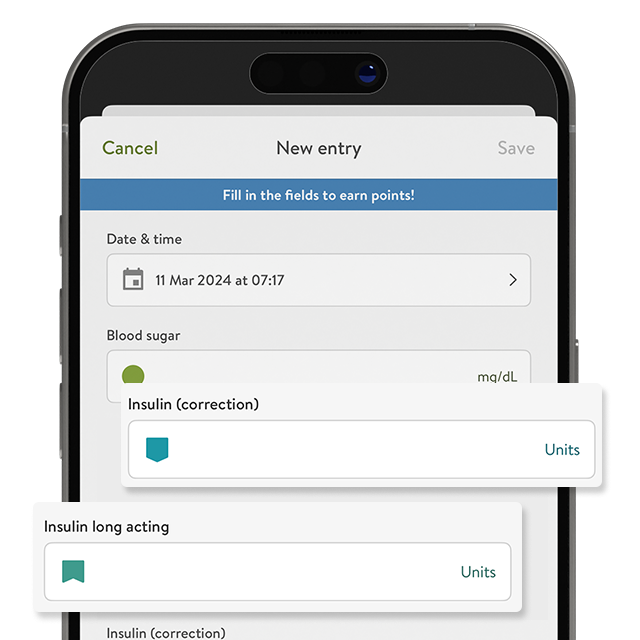
Connecting your devices & services
At mySugr, we’re of the humble opinion that paper is for origami, not for logbooks. That’s why when you connect your diabetes device with mySugr, your connected meter will automatically log your blood sugar readings into the app. No need to bother flipping through pages anymore! Everything’s available in a few taps in the app.
Connection Brings Freedom!
- Connect your blood glucose meter to help avoid manual logging errors.
- Connect your Google Fit® or Apple Health® tracker to easily track fitness data.
- Enjoy the extra time and flexibility in your days thanks to the pairing feature.
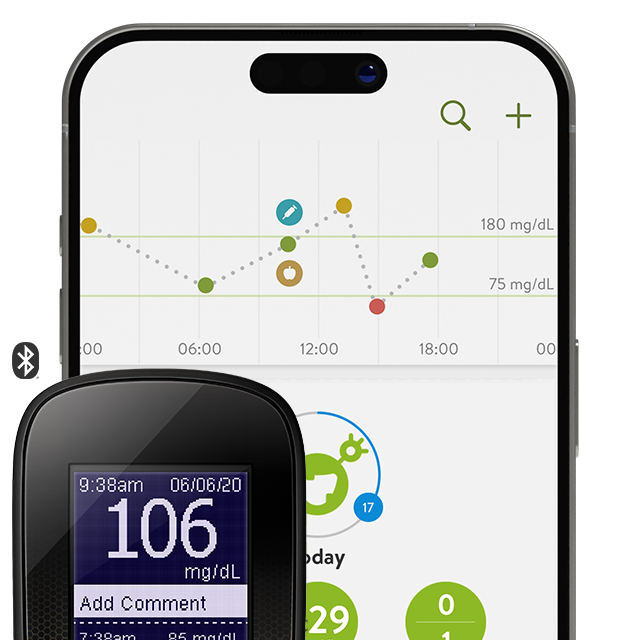
mySugr Analytics
Get a clear glimpse into what’s going on with your diabetes using mySugr Analytics. The dashboard in the mySugr app shows you an analysis of all the relevant data points as well as patterns in your blood sugar. Simply swipe to the left and access your diabetes data from the previous 7, 14, 30 or 90 days. Thanks to clear infographics, you’ll be able to work more efficiently with your healthcare team to identify areas where your management could be optimized.
Handy Info for Timely Decisions:
- Colorful infographics make for easy pattern detection.
- Compare weekday data and analyze blood sugar for trends.
- Simply swipe left and see patterns for the week, month, and even quarter.
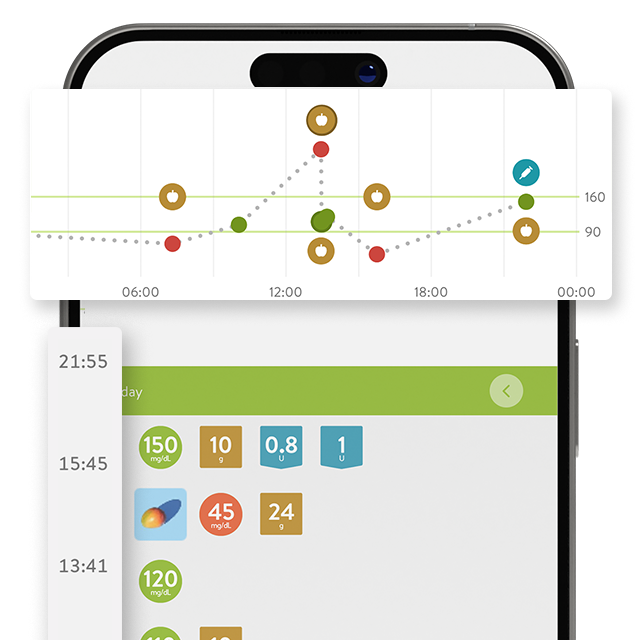
mySugr Meal Photos
When it comes to food logging, the more detail the better. ‘Pizza’ is not just pizza after all! With the Meal Photo feature in the mySugr app, you can tell the story behind your data. Keep track of how your body processes different foods, save your favorite meals, and become a carb counting connoisseur!
Take food logging to the next level!
- Keep a record of all your favorite meals and learn how they impact your blood sugar levels.
- Explore your unique insights to help make personalized, informed decisions about your eating habits.
- Become a carb-counting connoisseur!
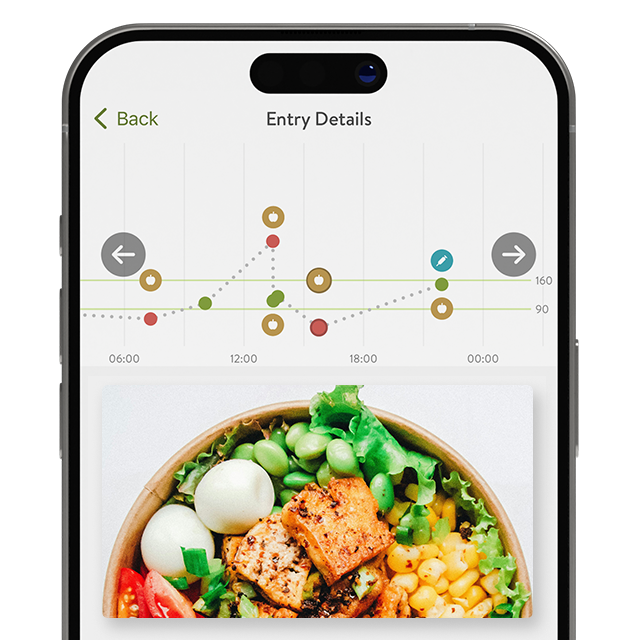
mySugr Report
Download and access all your diabetes data in just a few clicks! The mySugr Report compiles your data for easy printing or digital sharing. Thanks to the Report function, you can access your data anytime, anywhere, and even send an overview directly to your healthcare team. Secure, reliable data sharing means less hassle and more meaningful insights for you and your healthcare team, supporting better therapy outcomes!1-8
mySugr Reports provide you with:
- Blood Glucose (BG) average for the week.
- Standard Deviation for the week (how much your glucose has gone above or below your average glucose — the “swing” factor).
- All reported logs for activity, blood pressure, body weight, ketones, insulin injections, and more!
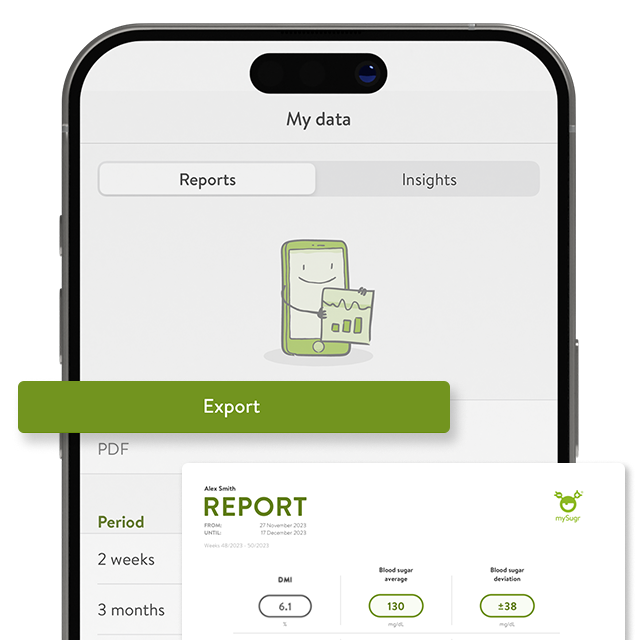
Upgrade to mySugr PRO for free!
Did you know that you can get mySugr Pro for free? Simply connect a compatible device to the mySugr app to upgrade to a PRO account. Learn more about the benefits below.
Basic
Free for Android and iOS.
Personalized Logging
Overview Progress Report
Only CSV Reports
Basic Challenges & Tags
Secure Data Backup
PRO
Sync a compatible device and get PRO for free.
+ Includes All Basic Features +
Multi-BGM Syncing
PDF & Excel Report
Basal Rate for Pump Users
Meal Photos
Blood Sugar Reminders
Empowering Challenges
More than 5 million downloads worldwide*. 4.6 stars user experience rating.
Average app rating in App Store and Google Play.
* From Jan 1, 2019 to March 4, 2024, based on aggregated numbers provided by the App stores consoles
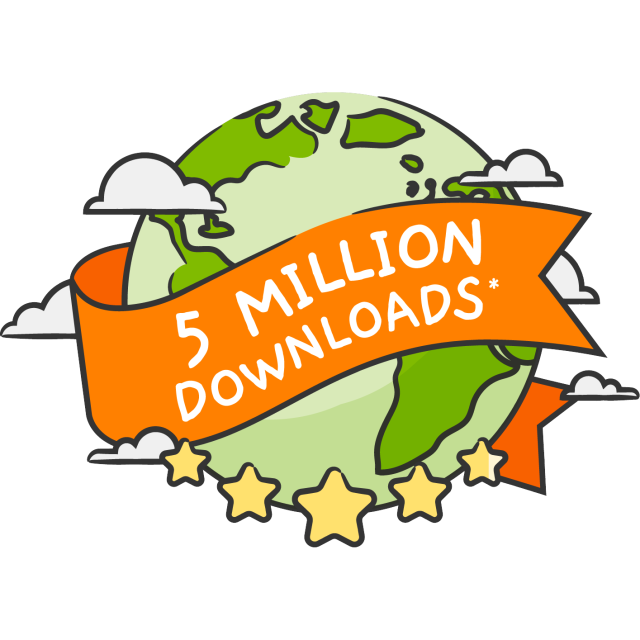
1 Debong F, Mayer H, and Kober J. Real-World Assessments of mySugr Mobile Health App. Diabetes Technology & Therapeutics, June 2019.
2 Kulzer B, Daenschel W, Daenschel I, et al. Integrated personalized diabetes management improves glycemic control in patients with insulin-treated type 2 diabetes: Results of the PDM-ProValue study program. Diabetes Research and Clinical Practice, 2018. 144:200-212.
3 Silver L. Smartphone Ownership Is Growing Rapidly Around the World, but Not Always Equally. Pew Research Center: Global Attitudes & Trends, 2019, February 5th.
4 Polonsky WH, Fisher L, Schikman CH, et al. Structured Self-Monitoring of Blood Glucose Significantly Reduces A1C Levels in Poorly Controlled, Noninsulin-Treated Type 2 Diabetes: Results From the Structured Testing Program Study. Diabetes Care, 2011. 34(2):262–267.
5 Weissmann J, Mueller A, Messinger D, Parkin CG, Amann-Zalan I. Improving the Quality of Outpatient Diabetes Care Using an Information Management System: Results From the Observational VISION Study. Journal of Diabetes Science and Technology, 2016.10(1):76–84.
6 Mora P, Buskirk A, Lyden M, et al. Use of a Novel, Remotely Connected Diabetes Management System Is Associated With Increased Treatment Satisfaction, Reduced Diabetes Distress, and Improved Glycemic Control in Individuals With Insulin-Treated Diabetes: First Results From the Personal Diabetes Management Study. Diabetes Technology & Therapeutics Vol. 19, No. 12, 2017. 19(12):715-722.
7 Brotons C, et al. Benefits of a Blood Glucose Data Reader Device in the Management of Type 2 Diabetes Mellitus: Primary Care Nurses Perspective. Poster session presented at ATTD 2012 Feb 8-11, Barcelona, Spain.
8 Hinnen DA, Buskirk A, Lyden M, et al. Use of Diabetes Data Management Software Reports by Health Care Providers, Patients With Diabetes, and Caregivers Improves Accuracy and Efficiency of Data Analysis and Interpretation Compared With Traditional Logbook Data: First Results of the Accu-Chek Connect Reports Utility and Efficiency Study (ACCRUES). Journal of Diabetes Science and Technology, 2015. 9(2):293-301.